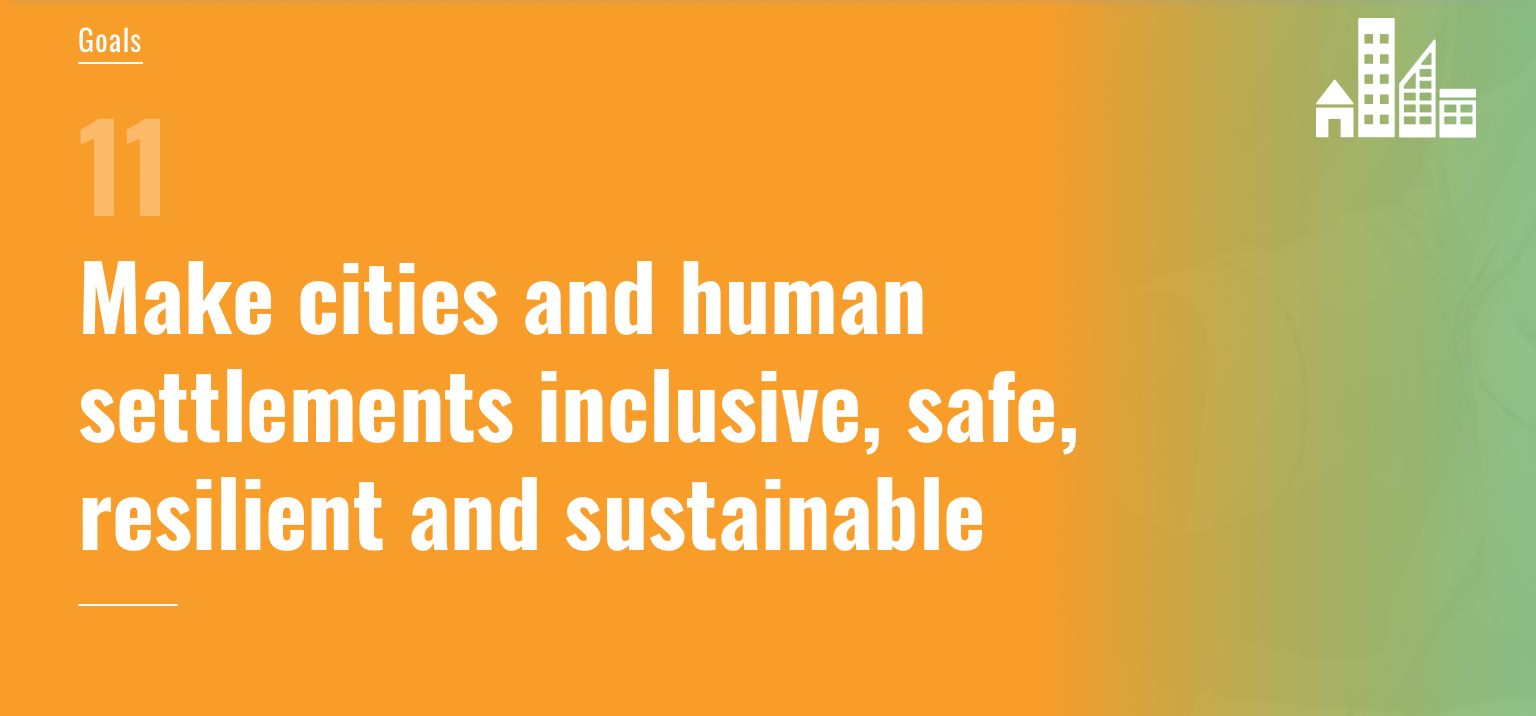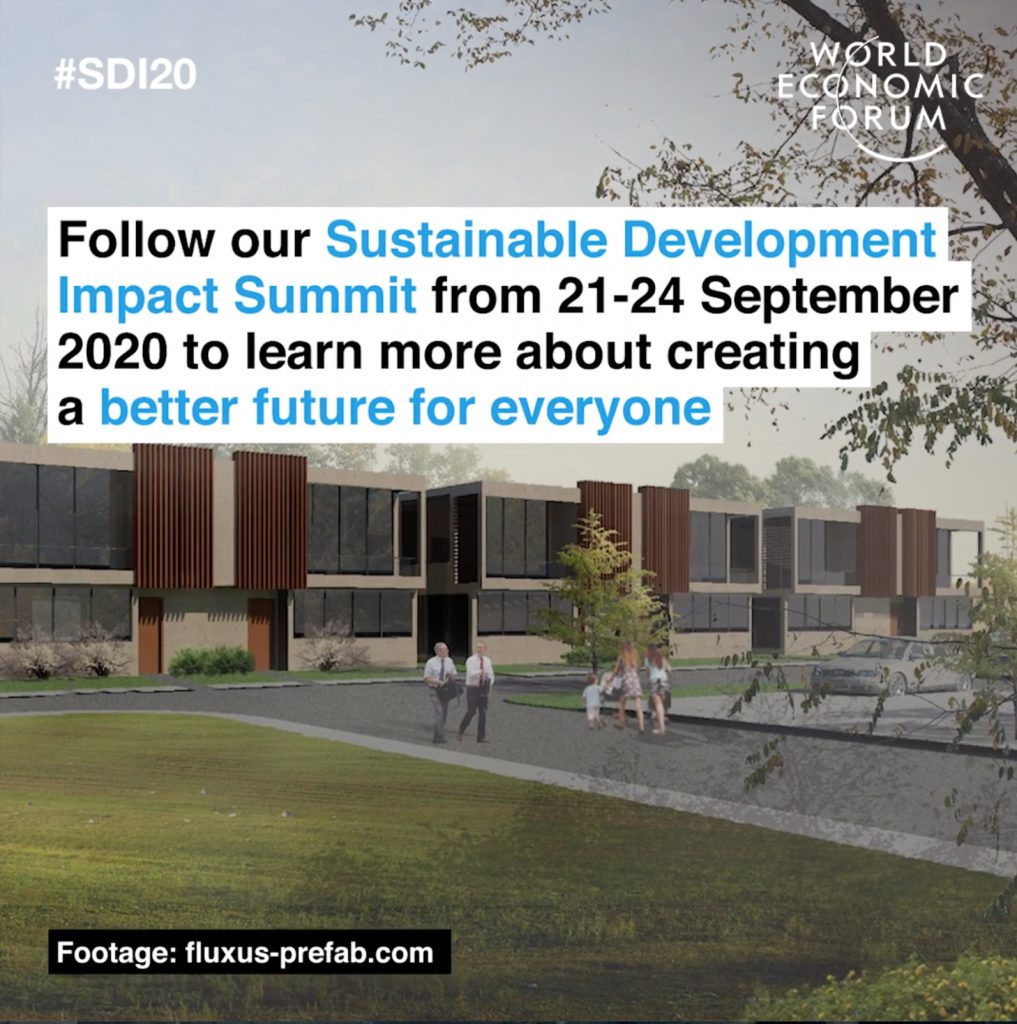21—24 September 2020
“Taking place in the context of the United Nations General Assembly, the World Economic Forum’s fourth and, for the first time, fully virtual Sustainable Development Impact Summit convenes leaders from government, business, international organizations and civil society along with a diverse group of experts and innovators to initiate, accelerate and scale-up entrepreneurial solutions to tackle climate change and advance sustainable development.”
– World Economic Forum
Fluxus CEO Fanyu Lin discusses how the company is working to advance the United Nations’ Sustainable Development Goal (SDG) 11. Sustainable Cities and Communities through pre-made homes with less waste, faster to build and kinder to the planet.

Full Interview:
World Economic Forum: What UN Sustainable Development Goal(s) is your work focused on?
Fanyu Lin: Our works are mainly focused on SDG 11. This goal is about making cities and human settlements inclusive, safe, resilient and sustainable. Its first target is to ensure that everyone will have access to adequate, safe and affordable housing by 2030. Home, is a safe heaven for some, but only a deep desire for many others. Feeling safe, stable and secure are the most basic human needs. We believe that everyone should be able to afford the luxury to have a place to call home, and it is a human right.
This is evermore so important now as the Covid-19 pandemic has highlighted the importance of high-quality housing to manage and control infections and recovery, particularly for lower income families who are living in overcrowded homes in densely populated areas of the world. According to the United Nations, now half of humanity, which is 3.5 billion people, lives in cities. And over 90 per cent of COVID-19 cases are occurring in urban areas. Turning housing as a driver for social, economic and environmental sustainability in the Great Reset should be our global goal.
World Economic Forum: What challenges stand in the way of this goal being addressed? What would happen if this was never addressed, in terms of the real-world impact?
Fanyu Lin: Urban inequality is one of the major challenges, which can lead to civil unrest and insecurity affecting every citizen. It goes hand in hand with the issue of living justice and affordable housing. UN-Habitat estimates that 3 billion people, which is 40% of world’s population, will need access to affordable housing in cities by 2030.
Other major challenges include the levels of urban energy consumption and pollution. Buildings are responsible for 40% of global greenhouse gas emissions, and consume 40% global energy, 25% global water. Often overlooked in these statistics are the challenges faced by working low-income households. As cities grow larger and competition for space increases, low income families are often pushed to live in the city’s lowest quality and poorest weatherized building stock. Low income housing represents 26% of all households but accounts for over 70% of emissions for all residential buildings in typical urban settings. By today’s standards, these homes are more than 50% less efficient than new homes.
World Economic Forum: Tell me about the unique solution have you identified/are you working on?
Fanyu Lin: Innovative construction is now crucial, as social distancing limits workers allowed on job sites, which slows the construction of new homes and buildings. Prefab construction powered by digital technology can help us safely create sustainable, high-quality housing at speed. Unlike traditionally built homes, prefab houses are assembled from components including walls and roofs that are produced in factories and delivered to site for assembly. This offers the opportunity to increase productivity. With artificial intelligence, design can be streamlined, making the building process simpler and smarter. We’ve developed an AI-enabled design and management toolkit for developers and governments to assess and deploy affordable housing projects. We can use big data and algorithms to create standardized designs very fast. The resulting designs can then be tested on a virtual platform. This means decisions and commitments can be made at an early stage, which speeds up the whole process, and supports a more collaborative approach for global partnerships across the housing delivery value chain.
In terms of improving sustainability, we believe that prefabrication can be part of the solution. Manufacturing components in a factory has been shown to cut emissions by up to 60%, compared to conventional construction. One significant factor is the sharp reduction of traffic movements by up to 40%. We believe energy-efficient housing solutions can play a critical role in accelerating the green economy and realizing a low-carbon future. Our solution is centered on substantially reducing home ownership cost which will in turn narrow the affordability gap presently experienced in low income households. We do this first by developing building envelope designs which exceed current industry energy efficiency standards. We then leverage advanced industrialized construction processes to reduce manufacturing cost and improve quality and reliability. In our system, the number of components are dramatically reduced, manufacture is optimized for the factory environment. Deployed at full potential, we estimate a 30% reduction in household ownership costs and a 45% reduction in greenhouse gas emissions. On a global scale, impact could amount to an emissions reduction of over 330 million metric tons of carbon dioxide per year.
World Economic Forum: What keeps you up at night regarding the efforts to tackle this goal?
Fanyu Lin: With increasing threats of climate crisis, natural disasters like earthquakes, hurricanes, floods and wildfires are happening more frequently around the world. Those challenges are without borders, and requires a philanthropic approach at the heart of our business model, rather than just an add-on. At Fluxus, we believe that design excellence can facilitate sustainable communities and enhance the well-being of the inhabitants. Our solution can assist in regenerating distressed neighborhoods and promote economic benefits, social integration and social mobility.
World Economic Forum: As our SDI summit comes during the UN week, what do you hope leaders will be addressing and discussing this week regarding that SDG?
Fanyu Lin: Any viable urban solution needs to incorporate the multi-dimensional wisdom from urban planning, public governance and multiculturalism justice. I hope our leaders can address this issue with radical transparency, authenticity and openness, nurturing businesses for the purpose of enhancing the quality of life, and guiding business community to take the lead to rebalance profit sharing in the general interest and to respond to rising unaffordability of urban development. Together, we can bring the field of dreams into fruition, to provide Universal Basic Housing in the most sustainable way, in alignment with the planet – our shared home.
Follow the conversation at the World Economic Forum’s Sustainable Development Impact Summit #sdi20 at Twitter LinkedIn Facebook Instagram

Back to NEWS & VIEWS